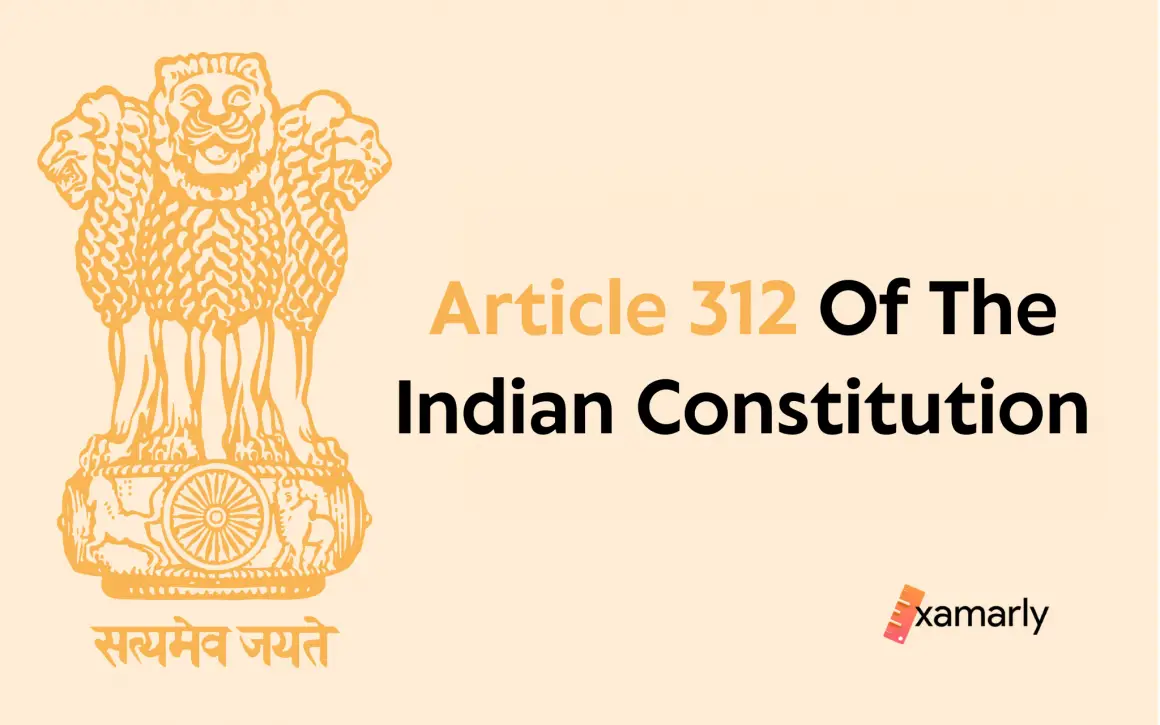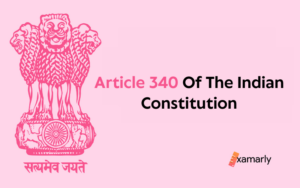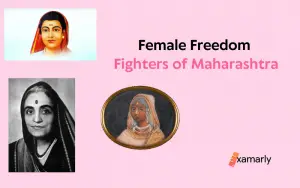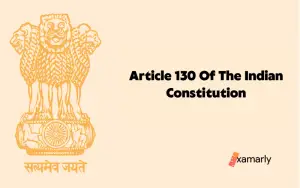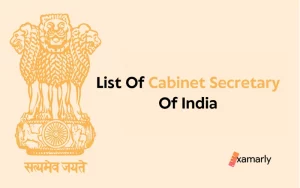Article 312 of the Indian Constitution deals with the concept of All-India services and grants the Indian Parliament the power to establish one or more All-India services, which are services that are common to the whole of the country. These services are essential for the smooth functioning of the government and the administration of the country.
In this blog, we will take a deeper look at the history and significance of Article 312, the role, responsibilities, and functions of All-India services, along with the amendments made to this article.
This blog will provide you with a comprehensive understanding of Article 312 of the Indian Constitution and the All-India services. So, let’s dive in and learn more about this important aspect of the Indian Constitution.
- Background Of Article 312 Of The Indian Constitution
- Article 312 Of The Indian Constitution – All-India services
- Clause 1 – As it is & Explained
- Clause 2 – As it is & Explained
- Clause 3 – As it is & Explained
- Clause 4 – As it is & Explained
- Amendments Related to Article 312 Of The Indian Constitution
- Amendments Under The 28th Amendment Act, 1972
- Article 312A
- Clause 1 – As it is & Explained
- Clause 2 – As it is & Explained
- Clause 3 – As it is & Explained
- Clause 4 – As it is & Explained
- What Is Meant By "All India Services?"
- All India Services Act, 1951
- Conclusion
- FAQs Related To Article 312 Of The Indian Constitution
- What is the purpose of Article 312 of the Indian Constitution?
- Who are the individuals covered under Article 312 of the Indian Constitution?
- How does Article 312 of the Indian Constitution ensure the smooth functioning of the services?
- What is the role of the Indian parliament in Article 312 of the Indian Constitution?
- How does Article 312 of the Indian Constitution ensure the integrity and accountability of All India Services?
- What are the All India Services?
- Who is eligible to join All India Services?
- What are the responsibilities of officers in the All India Services?
- What are the different cadres of All India Services?
- What is the role of the All India Services Act, 1951?
Background Of Article 312 Of The Indian Constitution
The Draft Article 282C, which would later become Article 312 in the Constitution of India 1950, was not present in the initial Draft Constitution of 1948. However, on September 8th, 1949, it was brought up for discussion in the Assembly.
This Draft Article would give the Parliament the authority to establish one or more all India services. Some members proposed amendments to the language of the Draft Article, but they did not change its overall meaning. Despite these proposed changes, the Assembly ultimately rejected all of the amendments and adopted the Draft Article as is on the same day.
Later on, in 1976, further additions were made to Article 312 through the 42nd Amendment.
Article 312 Of The Indian Constitution – All-India services
Clause 1 – As it is & Explained
—(1) Notwithstanding anything in Chapter VI of Part VI or Part XI, if the Council of States has declared by resolution supported by not less than two-thirds of the members present and voting that it is necessary or expedient in the national interest so to do, Parliament may by law provide for the creation of one or more all India services (including an all-India judicial service) common to the Union and the States, and, subject to the other provisions of this Chapter, regulate the recruitment, and the conditions of service of persons appointed, to any such service.
The first clause of Article 312 of the Indian Constitution discusses a provision that allows for the creation of an all-India service. An all-India service refers to a group of civil servants who work at the national level and are common to both the Union (i.e. the central government) and the States (i.e. the individual state governments). The provision is found in Chapter VI of Part VI or Part XI of the Indian Constitution.
The passage states that in order for Parliament (the legislative branch of the central government) to create an all-India service, the Council of States (one of the two houses of the Indian Parliament) must first pass a resolution supporting the creation of such a service. This resolution must be supported by at least two-thirds of the members present and voting. This requirement is put in place to ensure that the creation of an all-India service is deemed necessary or expedient in the national interest.
Once the Council of States has passed this resolution, Parliament is then able to pass a law creating one or more all-India services, including an all-India judicial service. This law will also regulate the recruitment and conditions of service for individuals appointed to these services. The passage also mentions that this regulation of recruitment and conditions of service is subject to the other provisions of the same chapter.
Clause 2 – As it is & Explained
(2) The services known at the commencement of this Constitution as the Indian Administrative Service and the Indian Police Service shall be deemed to be services created by Parliament under this article.
The second clause of Article 312 of the Indian Constitution refers to two specific services known as the Indian Administrative Service (IAS) and the Indian Police Service (IPS) that existed at the time the Indian Constitution was adopted.
This clause states that these services will be considered to have been officially established by the Indian parliament according to the provisions of this article, that is, Article 312. It can be inferred from this provision that the Indian Administrative Service (IAS) and the Indian Police Service (IPS) were already in existence at the time the Indian Constitution was adopted and were being considered to be part of the all-India services.
This passage is important because it establishes the legal status of the Indian Administrative Service (IAS) and Indian Police Service (IPS) as services created by the Indian parliament and thus subject to the regulations and provisions laid out in this article.
Clause 3 – As it is & Explained
(3) The all-India judicial service referred to in clause (1) shall not include any post inferior to that of a district judge as defined in article 236.
The third clause of Article 312 of the Indian Constitution is referring to the all-India judicial service that was mentioned in clause (1) of the article. It states that this all-India judicial service shall not include any post that is inferior to that of a district judge.
A district judge is a senior judicial position in the Indian judicial system. According to Article 236 of the Indian Constitution, a district judge is defined as a person appointed to the post of a district judge by the Governor of a State in consultation with the High Court.
This passage implies that the all-India judicial service is a higher level of judicial service that is only open to those who have reached the level of a district judge or higher. This is to ensure that the all-India judicial service is staffed by highly qualified and experienced individuals.
Clause 4 – As it is & Explained
(4) The law providing for the creation of the all-India judicial service aforesaid may contain such provisions for the amendment of Chapter VI of Part VI as may be necessary for giving effect to the provisions of that law and no such law shall be deemed to be an amendment of this Constitution for the purposes of article 368.
The final clause of Article 312 of the Indian Constitution is referring to the law that will be created by the Indian parliament for the creation of the all-India judicial service. It states that this law may contain provisions for the amendment of Chapter VI of Part VI of the Indian Constitution. The purpose of these amendments is to make the necessary changes to the Constitution to give effect to the provisions of the law creating the all-India judicial service.
It’s important to note that the law creating the all-India judicial service is not considered an amendment to the Indian Constitution. This means that the process for amending the Constitution as outlined in Article 368 of the Indian Constitution does not apply to this law. This is to emphasize that the changes to the Constitution made by this law are specific to the all-India judicial service and do not constitute a broader amendment to the Constitution.
Amendments Related to Article 312 Of The Indian Constitution
Article 312 of the Indian Constitution underwent some remarkable changes through The Constitution (28th Amendment) Act, 1972, and The Constitution (42nd Amendment) Act, 1976. Let’s know in detail what these amendments were.
Amendments Under The 42nd Amendment Act, 1976
The 42nd Amendment Act of 1976 made the following changes to Article 312 of the Indian Constitution:
- substitution of “Chapter VI of Part VI or Part XI” for “Part XI” in clause (1)
- insertion of the brackets and words “(including an all-India judicial service)” after the words “all-India services” in clause (1)
- insertion of clause (3) and clause (4)
Amendments Under The 28th Amendment Act, 1972
The 28th Amendment Act of 1972 added a new Article 312A which grants the authority to the Parliament to change or cancel the terms of service for the mentioned officers through legislation and includes necessary additional and related provisions.
Article 312A
Clause 1 – As it is & Explained
(1) Parliament may by law—
(a) vary or revoke, whether prospectively or retrospectively, the conditions of services as respects remuneration, leave and pension and the rights as respects disciplinary matters of persons who, having been appointed by the Secretary of State or Secretary of State in Council to a civil service of the Crown in India before the commencement of this Constitution, continue on and after the commencement of the Constitution (Twenty-eighth Amendment) Act, 1972, to serve under the Government of India or of a State in any service or post;
(b) vary or revoke, whether prospectively or retrospectively, the conditions of service as respects pension of persons who, having been appointed by the Secretary of State or Secretary of State in Council to a civil service of the Crown in India before the commencement of this Constitution, retired or otherwise ceased to be in service at any time before the commencement of the Constitution (Twenty-eighth Amendment) Act, 1972:
Provided that in the case of any such person who is holding or has held the office of the Chief Justice or other Judge of the Supreme Court or a High Court, the Comptroller and Auditor-General of India, the Chairman or other member of the Union or a State Public Service Commission or the Chief Election Commissioner, nothing in sub-clause (a) or sub-clause (b) shall be construed as empowering Parliament to vary or revoke, after his appointment to such post, the conditions of his service to his disadvantage except in so far as such conditions of service are applicable to him by reason of his being a person appointed by the Secretary of State or Secretary of State in Council to a civil service of the Crown in India.
The first clause of Article 312A of the Indian Constitution is discussing the power of the Indian parliament to make laws that affect the conditions of service, including remuneration, leave, and pension, as well as disciplinary matters of individuals who were appointed to the civil service of the Crown in India before the Indian Constitution came into effect. The clause specifically mentions that these laws can vary or revoke these conditions of service prospectively or retrospectively. This condition also applies to individuals who retired or otherwise ceased to be in service before the Constitution (Twenty-eighth Amendment) Act, 1972.
However, the clause also includes a provision that states that in the case of certain high-ranking officials such as the Chief Justice or other Judge of the Supreme Court or a High Court, the Comptroller and Auditor-General of India, the Chairman or other member of the Union or a State Public Service Commission or the Chief Election Commissioner, the parliament cannot vary or revoke their conditions of service to their disadvantage after their appointment to these positions, unless these conditions of service are applicable to them because of their appointment to the civil service of the Crown in India.
In summary, this provision is stating that the Indian parliament has the power to make laws that affect the conditions of service of individuals who were appointed to the civil service of the Crown in India before the Indian Constitution came into effect, however, it also provides an exception for certain high-ranking officials and states that the parliament cannot vary or revoke their conditions of service to their disadvantage after their appointment to these positions unless these conditions of service are applicable to them because of their appointment to the civil service of the Crown in India.
Clause 2 – As it is & Explained
(2) Except to the extent provided for by Parliament by law under this article, nothing in this article shall affect the power of any Legislature or other authority under any other provision of this Constitution to regulate the conditions of service of persons referred to in clause (1).
This second clause of Article 312A of the Indian Constitution is discussing the limits of the power of the Indian parliament to make laws regarding the conditions of service of individuals who were appointed to the civil service of the Crown in India before the Indian Constitution came into effect. It states that except to the extent provided for by Parliament by law under this article, nothing in this article shall affect the power of any legislature or other authority under any other provision of the Indian Constitution to regulate the conditions of service of persons referred to in clause (1).
In other words, this clause is emphasizing that the power of the Indian parliament to make laws regarding the conditions of service of these individuals is not absolute and that other authorities or legislatures within the Indian government also retain the power to regulate these conditions of service. However, it also makes it clear that the power of these other authorities or legislatures is limited to the extent provided by parliament by law under this article.
In summary, the provision is stating that the Indian parliament has a certain power to make laws regarding the conditions of service of individuals who were appointed to the civil service of the Crown in India before the Indian Constitution came into effect, but that power is not absolute and other authorities or legislatures also retain the power to regulate these conditions of service, but their power is limited by the laws passed by the parliament under this article.
Clause 3 – As it is & Explained
(3) Neither the Supreme Court nor any other court shall have jurisdiction in—
(a) any dispute arising out of any provision of, or any endorsement on, any covenant, agreement or other similar instrument which was entered into or executed by any person referred to in clause (1), or arising out of any letter issued to such person, in relation to his appointment to any civil service of the Crown in India or his continuance in service under the Government of the Dominion of India or a Province thereof;
(b) any dispute in respect of any right, liability or obligation under article 314 as originally enacted.
The third clause of Article 312A of the Indian Constitution is discussing the jurisdiction of the Indian courts, specifically the Supreme Court and other courts, in relation to certain types of disputes. It states that neither the Supreme Court nor any other court shall have jurisdiction in certain types of disputes.
The first type of dispute mentioned in (a) is any dispute arising out of any provision of, or any endorsement of, any covenant, agreement, or other similar instruments which were entered into or executed by any person referred to in clause (1) of this article. This type of dispute refers to any disagreements or issues that may arise from the provisions of agreements, covenants, or similar instruments that were entered into by individuals referred to in clause (1) in relation to their appointment to any civil service of the Crown in India or their continuance in service under the Government of the Dominion of India or a Province thereof.
The second type of dispute mentioned in (b) is any dispute in respect of any right, liability, or obligation under Article 314 of the Indian Constitution as originally enacted. This type of dispute refers to any disagreements or issues that may arise in relation to rights, liabilities, or obligations under a specific article of the Indian Constitution, Article 314 as it was originally written.
Clause 4 – As it is & Explained
(4) The provisions of this article shall have effect notwithstanding anything in article 314 as originally enacted or in any other provision of this Constitution.
The fourth and final clause of Article 312A of the Indian Constitution is stating that the provisions of this article will take effect regardless of any conflicting provisions in other parts of the Indian Constitution.
It specifically mentions that the provisions of this article will take effect despite any conflicting provisions in Article 314 as originally enacted or in any other provision of the Indian Constitution. This is to ensure that the provisions laid out in this article take precedence over any other provisions in the Constitution that may be in conflict with it.
What Is Meant By “All India Services?”
In the past, during the British colonial era, individuals who wanted to become civil servants were selected by the Court of Directors of the British East India Company. However, in the present day, candidates for these services are chosen by the Union Government in the federal political system in India. These individuals have the responsibility to serve both the state and the central government. This system gives the Union Government more power than the state government. During the British era, these services were known as Indian Civil Services.
After India gained independence in 1947, the Indian Civil Services (ICS) were replaced by the Indian Administrative Services (IAS), the Indian Police were replaced by the Indian Police Services (IPS), and were officially recognized by the Indian Constitution as All India Services. The Indian Forest Services (IFS) were added in 1963 and came into existence in 1966. Therefore, there are three types of All India Services, namely the IAS, IPS, and IFS.
The purpose, power and responsibilities of All India Services are outlined in the All India Services Act, 1951. The Act gives the Central Government the power to make rules for regulating the recruitment process and the mandatory conditions of services that a candidate must follow. The code of conduct for civil servants is defined in the All India Service (Conduct) Rules, 1968.
The Union Public Service Commission (UPSC) conducts a civil services exam every year to recruit IAS and IPS officers. For the IFS, the preliminary exam is combined with the civil service exam, but the rest of the stages are conducted separately. The selected candidates are trained by the Central Government and are then sent to their allocated state cadres.
The different cadres that control the All India Services are as follows: Indian Administrative Service (IAS) is controlled by the Ministry of Personnel, Public Grievances and Pensions, Indian Police Service (IPS) is controlled by the Ministry of Home Affairs, and Indian Forest Service (IFS) is controlled by the Ministry of Environment, Forests and Climate Change.
Responsibilities
The duties and responsibilities of officers in the All India Services vary based on their rank within the hierarchy, with junior level officers having different responsibilities than senior level officers. At the district level, the responsibilities of officers tend to focus on district-level development initiatives. On the divisional level, officers are responsible for maintaining and overseeing matters related to law and order. Officers at the state and central levels have the responsibility of creating and implementing policies.
The specific assignments or “cadres” of an officer are determined by the specific geographical region or “zone” in which they will be working. There are a total of 24 different cadres, with 3 of these being considered joint cadres.
Functions
One of the main functions of the All India Services branch is to promote individuals from the state services to positions in the IAS, IPS, and IFS. Additionally, the All India Services branch is responsible for providing advice and consultation when state service officers are being appointed to positions within the AIS cadre for periods of more than 6 months.
All India Services Act, 1951
The All India Services Act, 1951 is a law passed by the Indian parliament that governs the Indian Administrative Service (IAS), Indian Police Service (IPS), and Indian Forest Service (IFS).
The act outlines the purpose, power, and responsibilities of these All India Services and also provides for the rules and regulations for the recruitment process and conditions of service for individuals who wish to join these services. The act also empowers the Central Government to make rules for regulating the recruitment process and the mandatory conditions of services that a candidate must follow. The act is an important legislation that helps to ensure the smooth functioning of the IAS, IPS, and IFS and helps to uphold the integrity and accountability of these services.
Conclusion
In conclusion, Article 312 and Article 312A of the Indian Constitution play a crucial role in establishing and maintaining the conditions of service for the individuals in the Indian Administrative Service (IAS), Indian Police Service (IPS), and Indian Forest Service (IFS).
Article 312 of the Indian Constitution grants the Indian parliament the power to create laws related to the conditions of service of these individuals and also provides certain exemptions to this power. On the other hand, Article 312A was introduced to give the Indian parliament the authority to change or revoke the conditions of service of these individuals through legislation and also includes necessary additional and supporting provisions.
Together, these articles establish a comprehensive framework for regulating the conditions of service for these important services, which ensures their smooth functioning and upholds the integrity and accountability of these services. They ensure that the services are run in an effective and efficient way, with the ultimate goal of serving the people of India.
FAQs Related To Article 312 Of The Indian Constitution
What is the purpose of Article 312 of the Indian Constitution?
Article 312 of the Indian Constitution grants the Indian parliament the power to create laws related to the conditions of service of individuals in the Indian Administrative Service (IAS), Indian Police Service (IPS), and Indian Forest Service (IFS) and provides certain exemptions to this power.
Who are the individuals covered under Article 312 of the Indian Constitution?
Article 312 of the Indian Constitution applies to individuals in the Indian Administrative Service (IAS), Indian Police Service (IPS), and Indian Forest Service (IFS).
How does Article 312 of the Indian Constitution ensure the smooth functioning of the services?
Article 312 of the Indian Constitution establishes a framework for regulating the conditions of service for these important services, which ensures their smooth functioning by providing laws and regulations related to the conditions of service of individuals in the IAS, IPS, and IFS.
What is the role of the Indian parliament in Article 312 of the Indian Constitution?
The Indian parliament has the power to create laws related to the conditions of service of individuals in the IAS, IPS, and IFS under Article 312 of the Indian Constitution.
How does Article 312 of the Indian Constitution ensure the integrity and accountability of All India Services?
Article 312 of the Indian Constitution creates a framework for regulating the conditions of service for the All India Services, including the Indian Administrative Service (IAS), Indian Police Service (IPS), and Indian Forest Service (IFS). By providing laws and regulations related to the conditions of service of individuals in these services, Article 312 of the Indian Constitution ensures that the services are run in an effective and efficient manner, with the ultimate goal of maintaining integrity and accountability within the services.
What are the All India Services?
The All India Services (AIS) are a group of civil services that are common to both the Union and the States in India. They include the Indian Administrative Service (IAS), Indian Police Service (IPS), and Indian Forest Service (IFS).
Who is eligible to join All India Services?
To join All India Services, candidates must pass the Civil Services Examination conducted by the Union Public Service Commission (UPSC) and meet the other eligibility criteria set by the government.
What are the responsibilities of officers in the All India Services?
The responsibilities of officers in the All India Services vary based on their rank and the specific cadre to which they are assigned. They may include district-level development initiatives, maintenance of law and order, and policy-making at the state and central levels.
What are the different cadres of All India Services?
The different cadres of the All India Services are Indian Administrative Service (IAS), Indian Police Service (IPS), and Indian Forest Service (IFS). In total there are 24 cadres and 3 of them are joint cadres.
What is the role of the All India Services Act, 1951?
The All India Services Act, 1951 is a law passed by the Indian parliament that governs the Indian Administrative Service (IAS), Indian Police Service (IPS), and Indian Forest Service (IFS). The act outlines the purpose, power, and responsibilities of these All India Services and also provides for the rules and regulations for the recruitment process and conditions of service for individuals who wish to join these services.


